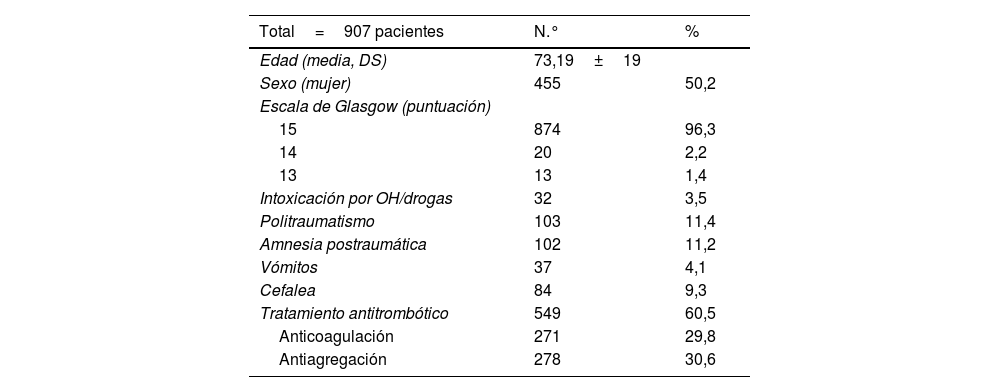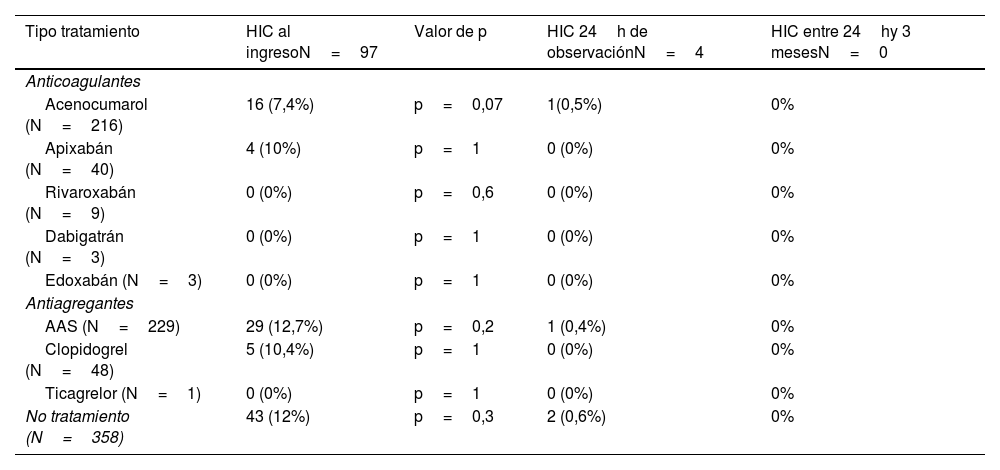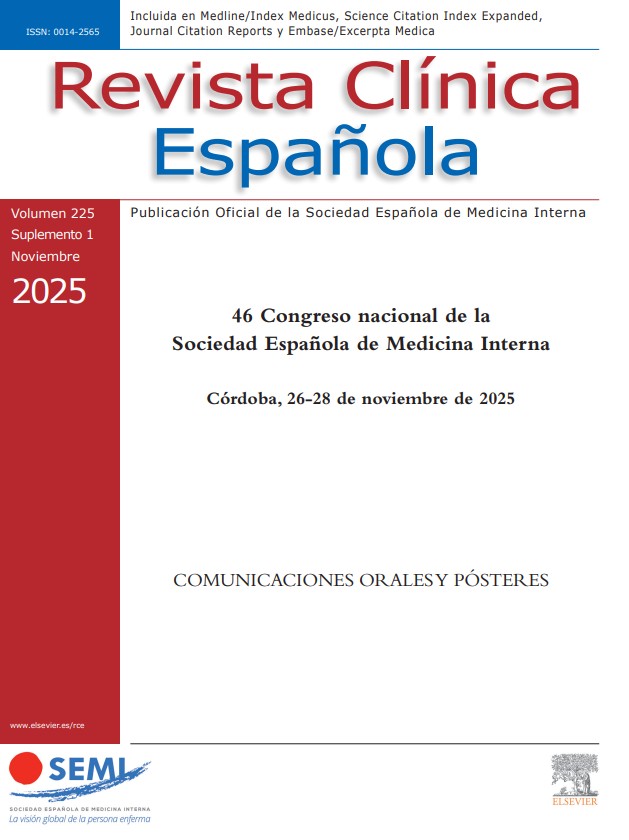El tiempo de observación en el traumatismo craneoencefálico leve (TCEL) es controvertido. Nuestro objetivo se basó en evaluar el riesgo de complicaciones neurológicas en el TCEL con y sin tratamiento antitrombótico.
MétodoEvaluamos retrospectivamente los pacientes con TCEL atendidos en urgencias durante 3 años. Consideramos TCEL aquellos con Glasgow ≥13 al ingreso. Se realizó una TC craneal en todos los casos con >1 factor de riesgo al ingreso y a las 24h en aquellos con deterioro neurológico o TC craneal inicial patológica. Se revisó retrospectivamente las complicaciones en los siguientes 3 meses.
ResultadosEvaluamos 907 pacientes con una edad media de 73±19 años. El 91% presentaron factores de riesgo, con un 60% en tratamiento antitrombótico. Detectamos un 11% de hemorragia cerebral inicial, 0,4% a las 24h y ningún caso a los 3 meses. El tratamiento antitrombótico no se asoció con incremento de riesgo de hemorragia cerebral (9,9 con vs. 11,9% sin tratamiento; p=0,3). El 39% de las hemorragias presentaron síntomas neurológicos (18% amnesia postraumática, 12% cefalea, 8% vómitos, 1% convulsiones), siendo en un 78,4% síntomas leves. De las 4 hemorragias detectadas a las 24h, 3 fueron asintomáticas y un caso emporó la cefalea inicial. Ningún paciente asintomático sin lesión en la TC craneal inicial presentó clínica a las 24h.
ConclusionesNuestro estudio sugiere que los pacientes con TCEL asintomáticos, sin lesión en la TC craneal inicial no precisarían periodo de observación ni TC craneal de control, independientemente del tratamiento antitrombótico o nivel de INR.
The observation time in mild traumatic brain injury (mTBI) is controversial. Our aim was to assess the risk of neurological complications in mTBI with and without antithrombotic treatment.
MethodWe retrospectively evaluated patients with mTBI seen in the emergency room for 3 years. We considered MTBI those with Glasgow ≥13 at admission. A cranial CT was performed in all cases with >1 risk factor at admission and at 24h in those with neurological impairment or initial pathological cranial CT. Complications in the following 3 months were retrospectively reviewed.
ResultsWe evaluated 907 patients with a mean age of 73±19 years. Ninety-one percent presented risk factors, with 60% on antithrombotic treatment. We detected 11% of initial brain hemorrhage, 0.4% at 24h, and no cases at 3 months. Antithrombotic treatment was not associated with an increased risk of brain hemorrhage (9.9% with vs. 11.9% without treatment, P=.3). 39% of the hemorrhages presented neurological symptoms (18% post-traumatic amnesia, 12% headache, 8% vomiting, 1% seizures), with 78.4% having mild symptoms. Of the 4 hemorrhages detected at 24h, 3 were asymptomatic and one case that worsened the initial headache. No asymptomatic patient without lesion on initial clinical cranial CT presented at 24h.
ConclusionsOur study suggests that patients with asymptomatic mTBI, without a lesion on the initial cranial CT, would not require the observation period or CT control regardless of antithrombotic treatment or INR level.
Artículo
Diríjase desde aquí a la web de la >>>FESEMI<<< e inicie sesión mediante el formulario que se encuentra en la barra superior, pulsando sobre el candado.

Una vez autentificado, en la misma web de FESEMI, en el menú superior, elija la opción deseada.

>>>FESEMI<<<











